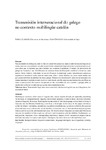Mostrar o rexistro simple do ítem
Transmisión interxeracional do galego no contexto multilingüe catalán
| dc.contributor.author | Larraña, Sabela | es_ES |
| dc.contributor.author | González, Iago | es_ES |
| dc.date.accessioned | 2014-10-02T12:18:31Z | |
| dc.date.available | 2014-10-02T12:18:31Z | |
| dc.date.issued | 2012 | es_ES |
| dc.identifier.citation | Novas achegas ao estudo da cultura galega II. Enfoques socio-históricos e lingüístico-literarios; 2012: 59-76. ISBN: 978-84-9749-517-2 | es_ES |
| dc.identifier.isbn | 978-84-9749-517-2 | es_ES |
| dc.identifier.uri | http://hdl.handle.net/2183/13256 | |
| dc.description.abstract | [Resumo] Nas sociedades multilingües, onde se dan con maior frecuencia os casos de parellas mixtas lingüisticamente, interesa especialmente estudar os patróns de transmisión lingüística interxeracional para averiguar cales son os factores que máis inciden nas condutas lingüísticas. O estudo da transmisión do galego en Cataluña e nas Illas Baleares no contexto desas familias pode contribuír a botar luz neste asunto. Neste traballo, elaborado no seo do Proxecto Evotranling1 cunha metodoloxía cualitativa, expomos os resultados dunha serie de entrevistas feitas a varias familias das zonas mencionadas nas que un dos membros da parella é de orixe galega. Téntase con elas descubrir cales son as actitudes e os comportamentos lingüísticos tanto entre os membros da parella como na súa interacción cos fillos, así como as proxeccións dos marcos interpretativos das sociedades de orixe (catalá e galega) sobre as ideoloxías explícitas e implícitas que guían estes comportamentos. | es_ES |
| dc.description.abstract | [Abstract] Multilingual societies, where cases of linguistically mixed couples abound, are especially interesting for the study of intergenerational linguistic transmission patterns, in order to detect the most influential factors in linguistic behaviour. Studying the transmission of Galician language within families living in Catalonia and the Balearic Islands may contribute to shed light on this issue. In this paper, elaborated within the project Evotranling, according to a qualitative methodology, we aim at explaining the outcome of several interviews with several mixed families with at least one of their members originating from Galicia and living in the aforementioned areas. We tried to detect linguistic attitudes and behaviours between the members of the couple as well as in their interaction with the children. Furthermore, we analysed the projection of the corresponding interpretive frames of their societies of origin (Catalan and Galician) onto the explicit and implicit ideologies that drive these attitudes and behaviours. | es_ES |
| dc.language.iso | glg | es_ES |
| dc.publisher | Universidade da Coruña | es_ES |
| dc.subject | Transmisión lingüística interxeracional | es_ES |
| dc.subject | Ideoloxías lingüísticas | es_ES |
| dc.subject | Multilingüismo | es_ES |
| dc.subject | Linguas minoritarias | es_ES |
| dc.subject | Intergenerational linguistic transmission | es_ES |
| dc.subject | Language ideologies | es_ES |
| dc.subject | Multilingualism | es_ES |
| dc.subject | Minority languages | es_ES |
| dc.title | Transmisión interxeracional do galego no contexto multilingüe catalán | es_ES |
| dc.type | info:eu-repo/semantics/conferenceObject | es_ES |
| dc.rights.access | info:eu-repo/semantics/openAccess | es_ES |






